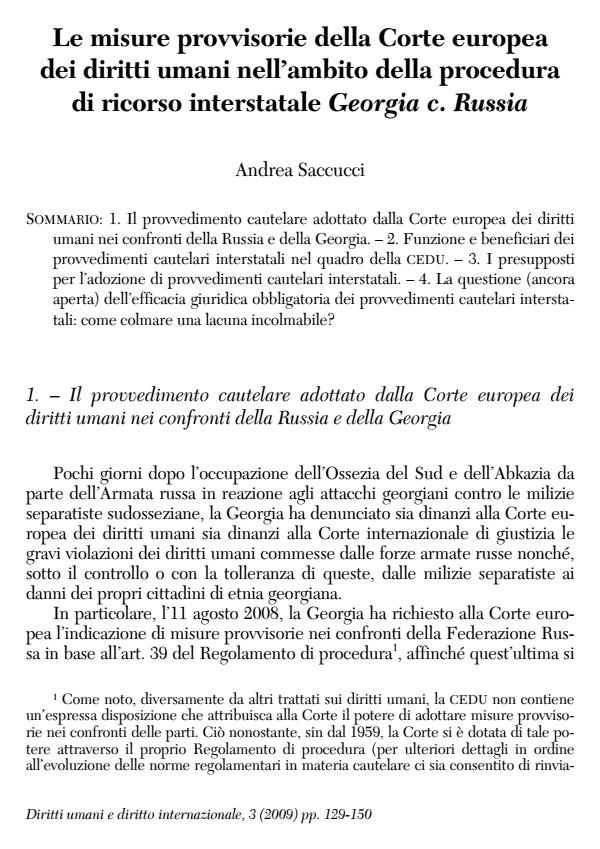Le misure provvisorie della Corte europea dei diritti umani nell’ambito della procedura di ricorso interstatale Georgia c. Russia
Journal title DIRITTI UMANI E DIRITTO INTERNAZIONALE
Author/s Andrea Saccucci
Publishing Year 2009 Issue 2009/1
Language Italian Pages 22 P. 129-150 File size 204 KB
DOI 10.3280/DUDI2009-001006
DOI is like a bar code for intellectual property: to have more infomation
click here
Below, you can see the article first page
If you want to buy this article in PDF format, you can do it, following the instructions to buy download credits

FrancoAngeli is member of Publishers International Linking Association, Inc (PILA), a not-for-profit association which run the CrossRef service enabling links to and from online scholarly content.
The provisional measures of the European Court of Human Rights within the framework of the interstate complaint procedure Georgia v. Russia - In the case Georgia v. Russia, the European Court has adopted provisional meas- ures requesting both States parties to ensure compliance with their engagements under the ECHR, particularly in respect of the right to life (Article 2) and the prohibition of tor- ture and inhuman or degrading treatment (Article 3). It is the first time in the Court’s history that Rule 39 of its Rules of Procedure is applied in the framework of an inter- state complaint procedure. Being themselves aimed at safeguarding pendente lite the rights of individuals exposed to the imminent risk of an irreparable damages rather than to protect States’ own rights, inter-state provisional measures are subject to a legal re- gime largely correspondent to that of provisional measures adopted on request of an in- dividual applicant. Notwithstanding the despicable absence of any reasoning, the in- terim protection accorded by the Court in the case Georgia v. Russia seems to fall squarely within the previous practice in individual cases as to procedural and substantial requirements, certain peculiarities being in fact a mere consequence of the rules appli- cable to inter-state litigation and of the specific object of the complaint filed by Georgia in relation to an ongoing armed conflict. The most controversial issue remains that of the binding nature of provisional measures, given that the solution embraced by the re- cent Court’s case-law relies on the obligation not to hinder the effective exercise of the right of individual petition and cannot be extended to inter-state complaints. A proposal for a different approach is therefore offered, which links the binding nature of provi- sional measures to the substantive obligations they seek to ensure respect for against possible violations having irreparable consequences.
- Provisional Measures Issued by International Courts and Tribunals Giuseppe Pascale, pp.253 (ISBN:978-94-6265-410-5)
- Provisional Measures Issued by International Courts and Tribunals Andrea Saccucci, pp.215 (ISBN:978-94-6265-410-5)
Andrea Saccucci, Le misure provvisorie della Corte europea dei diritti umani nell’ambito della procedura di ricorso interstatale Georgia c. Russia in "DIRITTI UMANI E DIRITTO INTERNAZIONALE" 1/2009, pp 129-150, DOI: 10.3280/DUDI2009-001006